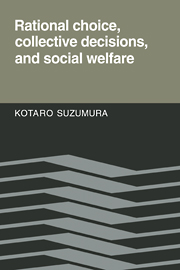Book contents
- Frontmatter
- Contents
- Preface
- Chapter 1 Prologue
- Chapter 2 Rational choice and revealed preference
- Chapter 3 Arrovian impossibility theorems
- Chapter 4 Simple majority rule and extensions
- Chapter 5 The fairness-as-no-envy approach in social choice theory
- Chapter 6 Impartiality and extended sympathy
- Chapter 7 Individual rights and libertarian claims
- Chapter 8 Epilogue
- Notes
- Bibliography
- Index
Chapter 3 - Arrovian impossibility theorems
Published online by Cambridge University Press: 07 October 2011
- Frontmatter
- Contents
- Preface
- Chapter 1 Prologue
- Chapter 2 Rational choice and revealed preference
- Chapter 3 Arrovian impossibility theorems
- Chapter 4 Simple majority rule and extensions
- Chapter 5 The fairness-as-no-envy approach in social choice theory
- Chapter 6 Impartiality and extended sympathy
- Chapter 7 Individual rights and libertarian claims
- Chapter 8 Epilogue
- Notes
- Bibliography
- Index
Summary
There is only one law which by its nature requires unanimous assent. This is the social pact: For the civil association is the most voluntary act in the world; every man having been born free and master of himself, no one else may under any pretext whatever subject him without his consent.…Apart from this original contract, the votes of the greatest number always bind the rest; and this is a consequence of the contract itself.
Jean-Jacques RousseauIntroduction
Consider a group of individuals characterized by the coexistence of the potential benefit of cooperation within the group, and the conflict with respect to the way the fruit thereof is to be distributed among members. In order that this group may form a cooperative society that is organizationally stable as a voluntary association of free individuals, a prior and binding agreement on the rule for resolving such distributional conflicts as may arise among them in the future seems to be definitely needed. An important and distinctive feature of this problem of rule design is that individuals do not, and indeed cannot, necessarily foresee the issues that may possibly be in dispute, nor do they have full information as to the natural abilities and other personal characteristics of each other. The purpose of this chapter is to consider the problem of rule design paying due attention to this informational constraint.
- Type
- Chapter
- Information
- Rational Choice, Collective Decisions, and Social Welfare , pp. 62 - 100Publisher: Cambridge University PressPrint publication year: 1983



